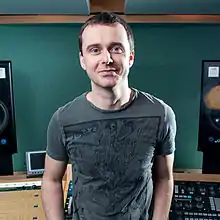Matt Colton | |
|---|---|
 | |
| Background information | |
| Birth name | Matt Colton |
| Also known as | The Alchemist |
| Born | 30 March 1975 |
| Genres | |
| Occupation(s) | Mastering engineer |
| Years active | 1997–present |
| Labels | |
Matt Colton (born 30 March 1975) is an English mastering engineer and member of the mastering group of the Music Producers Guild. He has mastered recordings for artists such as Muse, Coldplay, James Blake, George Michael, Hot Chip, Gary Numan, Peter Gabriel, Flume, Erasure, and Depeche Mode.
He began his mastering career as an engineer at Porky's Mastering in London, run by George 'Porky' Peckham in 1997 where he worked with a diverse range of artists from Aphex Twin's Rephlex Records to Kylie Minogue, and has also worked at Optimum Mastering, Alchemy Soho and AIR Studios where he cut the vinyl masters for Coldplay's Mylo Xyloto, remastered George Michael's Faith, and worked on the debut album by James Blake.
In 2012 Colton rejoined Alchemy Mastering as a director and engineer, mastering James Blake's Mercury Prize-winning second album Overgrown, Hot Chip's Why Make Sense?, and Leftfield's Alternative Light Source. Colton is one of the few mastering engineers in the world to offer half speed vinyl mastering, a technique which, although time-consuming, can offer much improved vinyl sound quality. He mastered the vinyl release for the number one album Drones by Muse at half speed, as well as remastering Peter Gabriel's first four solo albums [1] and his upcoming album i/o.
Colton was awarded the Music Producers Guild (MPG) Mastering Engineer of the year award in 2013.[2] He has lectured on mastering at various institutions including the London Electronic Music Event, Prism's Mic to Mastering tour, Alchemea College in London, and dBS Music Technology college in Bristol.[3]
Selected discography
- Arca - Xen 2014
- Archie Bronson Outfit - Wild Crush 2014
- Aphex Twin - Selected Ambient Works (remastered) 2013
- Blood Orange - Cupid Deluxe 2013
- Caribou - Our Love 2014
- Cherry Ghost - Herd Runners 2014
- Christine and the Queens - Chaleur Humaine 2014
- Claude VonStroke - Bird Brain 2008
- Coldplay - Mylo Xyloto 2011
- Denai Moore - Elsewhere 2015
- Depeche Mode - Memento Mori 2023
- Dreadzone - Second Light (remastered) 2012
- Drexciya - Harnessed The Storm (remastered) 2015
- Elliott Smith - Elliott Smith 1998
- Erasure - The Neon 2020
- The Feeling - Boy Cried Wolf 2013
- FKA Twigs - EP2 2013
- Flume - Flume 2012
- Flume - Skin 2016
- Four Tet - Morning/Evening 2015
- Foxes - All I Need 2015
- Francois & the Atlas Mountains - Piano Ombre 2014
- Gary Numan - Splinter 2013
- Georgia - Georgia 2015
- George Michael - Faith (remastered) 2011
- Hot Chip - Why Make Sense? 2015
- Jack Colwell - When The World Explodes EP 2016
- JJ DOOM - Key to the Kuffs 2012
- James Blake - Overgrown 2013
- Jimi Goodwin - Odludek 2014
- Kanye West - "Flashing Lights" 2008
- Låpsley - Hurt me 2015
- Leftfield - Alternative Light Source 2015
- Liars - Mess 2014
- Lee "Scratch" Perry - The Complete Upsetter 1999
- Manic Street Preachers - The Holy Bible (remastered) 2015
- Maoupa Mazzocchetti - A-Tranquility 2014
- Marilina Bertoldi - Prender Un Fuego 2018
- Meat Beat Manifesto - Autoimmune 2008
- Metronomy - Love letters 2014
- Michael Kiwanuka - Kiwanuka (album) 2019
- Misty Miller - Sweet Nothings ep 2015
- Mumford & Sons - Whispers In The Dark 2012
- Muse - Drones 2015
- Neneh Cherry - Blank Project 2014
- New Order - Movement (remastered) 2013
- Nosaj Thing - Fated 2015
- Panda Bear - Crosswords EP 2015
- Peter Gabriel - 1 , 2 , 3 , 4 , 3d , 4d (half speed remasters) 2015
- Seekae - The Worry 2014
- Sleaford Mods - Key Markets 2015
- Small Faces - Ogdens' Nut Gone Flake (remastered) 2013
- Squarepusher - Damogen Furies 2012
- Sunn O))) – Life Metal 2019
- Surgeon - Tresor 97 – 99 (remastered) 2015
- Swans - The Seer 2015
- Swim - Deep Mothers 2015
- T E T S U E - Shortcuts 2019
- TĀLĀ - Malika ep 2015
- Temples - Live in Japan 2014
- Tensnake - Glow 2014
- Thurston Moore - The Best Day 2014
- Twin Peaks – Lookout Low 2019
- V V Brown - Samson & Delilah 2013
- yahyel - "Once / The Flare" 2016
- umru - search result 2018
References
- ↑ "Double Vinyl Remastered". PeterGabriel.com. Retrieved 28 April 2019.
- ↑ "2013 Winners". The Music Producers Guild. 21 January 2014. Retrieved 28 April 2019.
- ↑ "Masterclasses in Mastering (w/ Matt Colton)". YouTube. 9 January 2011. Retrieved 28 April 2019.